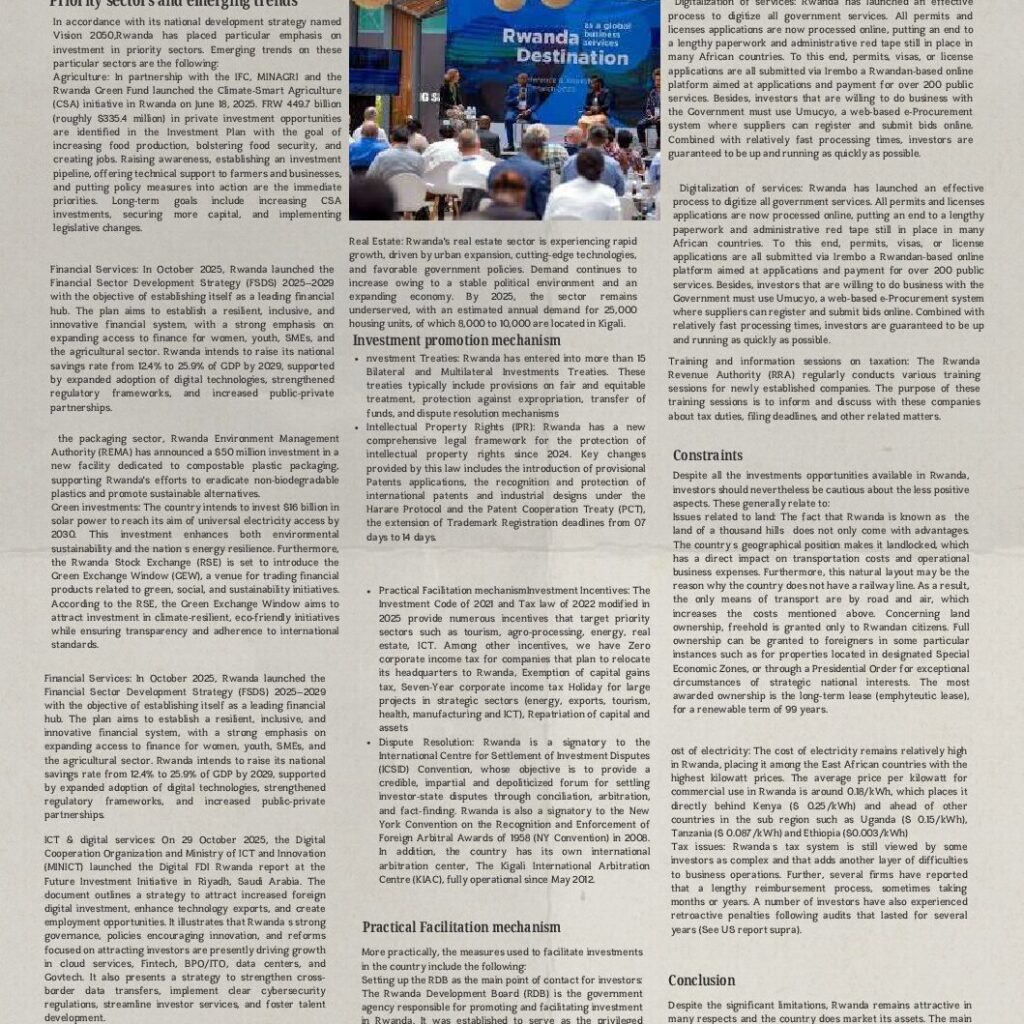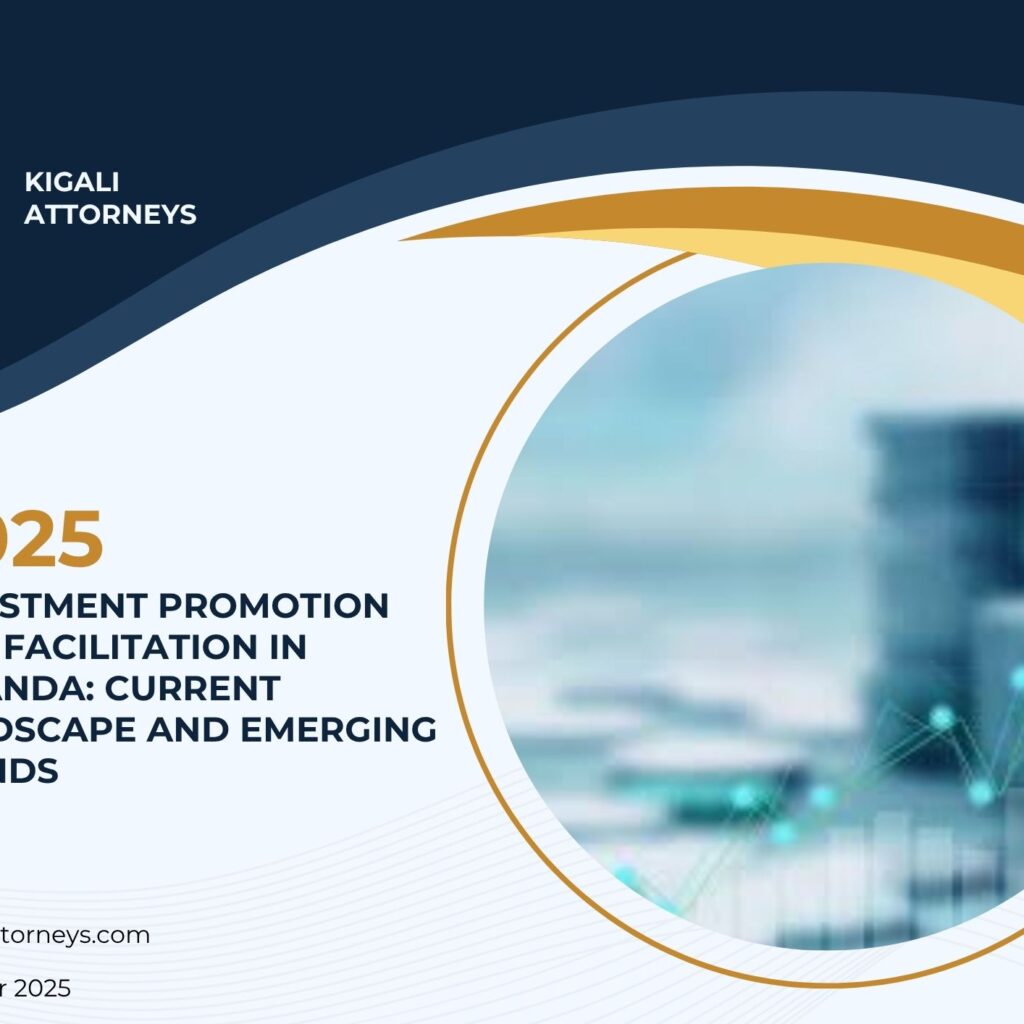“In 2024, Rwanda secured USD 3.2 billion in investment commitments—representing a 32.4% increase from the previous year and surpassing the national target of USD 2.4 billion. This underscores the Rwanda’s positioning as one of the major emerging economy in the region, but also a signal of the growing investor confidence in the country’s strategic reforms and facilitations efforts. This article examines new trends in investment, general promotion mechanisms, as well as practical processes highlighted to attract and facilitate investment in Rwanda.
Priority sectors and emerging trends
In accordance with its national development strategy named Vision 2050,Rwanda has placed particular emphasis on investment in priority sectors. Emerging trends on these particular sectors are the following:
Agriculture: In partnership with the IFC, MINAGRI and the Rwanda Green Fund launched the Climate-Smart Agriculture (CSA) initiative in Rwanda on June 18, 2025. FRW 449.7 billion (roughly $335.4 million) in private investment opportunities are identified in the Investment Plan with the goal of increasing food production, bolstering food security, and creating jobs. Raising awareness, establishing an investment pipeline, offering technical support to farmers and businesses, and putting policy measures into action are the immediate priorities. Long-term goals include increasing CSA investments, securing more capital, and implementing legislative changes.
Manufacturing: Rwanda intends to elevate its total export value to $4.9 billion by 2026, representing an increase from $4.2 billion in 2024/25, according to Ministry of Trade and Industry (MINICOM). Expansion will be supported by new industrial developments, including the A1 Iron & Steel plant in the Musanze Industrial Park, which will process iron ore and produce various construction steel products such as TMT bars, wire rods, hot-rolled strips, and beams. In the packaging sector, Rwanda Environment Management Authority (REMA) has announced a $50 million investment in a new facility dedicated to compostable plastic packaging, supporting Rwanda’s efforts to eradicate non-biodegradable plastics and promote sustainable alternatives.
Green investments: The country intends to invest $16 billion in solar power to reach its aim of universal electricity access by 2030. This investment enhances both environmental sustainability and the nation’s energy resilience. Furthermore, the Rwanda Stock Exchange (RSE) is set to introduce the Green Exchange Window (GEW), a venue for trading financial products related to green, social, and sustainability initiatives. According to the RSE, the Green Exchange Window aims to attract investment in climate-resilient, eco-friendly initiatives while ensuring transparency and adherence to international standards.
Financial Services: In October 2025, Rwanda launched the Financial Sector Development Strategy (FSDS) 2025–2029 with the objective of establishing itself as a leading financial hub. The plan aims to establish a resilient, inclusive, and innovative financial system, with a strong emphasis on expanding access to finance for women, youth, SMEs, and the agricultural sector. Rwanda intends to raise its national savings rate from 12.4% to 25.9% of GDP by 2029, supported by expanded adoption of digital technologies, strengthened regulatory frameworks, and increased public-private partnerships.
ICT & digital services: On 29 October 2025, the Digital Cooperation Organization and Ministry of ICT and Innovation (MINICT) launched the Digital FDI Rwanda report at the Future Investment Initiative in Riyadh, Saudi Arabia. The document outlines a strategy to attract increased foreign digital investment, enhance technology exports, and create employment opportunities. It illustrates that Rwanda’s strong governance, policies encouraging innovation, and reforms focused on attracting investors are presently driving growth in cloud services, Fintech, BPO/ITO, data centers, and Govtech. It also presents a strategy to strengthen cross-border data transfers, implement clear cybersecurity regulations, streamline investor services, and foster talent development.
Real Estate: Rwanda’s real estate sector is experiencing rapid growth, driven by urban expansion, cutting-edge technologies, and favorable government policies. Demand continues to increase owing to a stable political environment and an expanding economy. By 2025, the sector remains underserved, with an estimated annual demand for 25,000 housing units, of which 8,000 to 10,000 are located in Kigali.
Investment promotion mechanism
The country has long since established several mechanisms aimed at attracting a growing number of investors namely:
- Investment Treaties: Rwanda has entered into more than 15 Bilateral and Multilateral Investments Treaties. These treaties typically include provisions on fair and equitable treatment, protection against expropriation, transfer of funds, and dispute resolution mechanisms
- Intellectual Property Rights (IPR): Rwanda has a new comprehensive legal framework for the protection of intellectual property rights since 2024. Key changes provided by this law includes the introduction of provisional Patents applications, the recognition and protection of international patents and industrial designs under the Harare Protocol and the Patent Cooperation Treaty (PCT), the extension of Trademark Registration deadlines from 07 days to 14 days.
- Investment Incentives: The Investment Code of 2021 and Tax law of 2022 modified in 2025 provide numerous incentives that target priority sectors such as tourism, agro-processing, energy, real estate, ICT. Among other incentives, we have Zero corporate income tax for companies that plan to relocate its headquarters to Rwanda, Exemption of capital gains tax, Seven-Year corporate income tax Holiday for large projects in strategic sectors (energy, exports, tourism, health, manufacturing and ICT), Repatriation of capital and assets
- Dispute Resolution: Rwanda is a signatory to the International Centre for Settlement of Investment Disputes (ICSID) Convention, whose objective is to provide a credible, impartial and depoliticized forum for settling investor-state disputes through conciliation, arbitration, and fact-finding. Rwanda is also a signatory to the New York Convention on the Recognition and Enforcement of Foreign Arbitral Awards of 1958 (NY Convention) in 2008. In addition, the country has its own international arbitration center, The Kigali International Arbitration Centre (KIAC), fully operational since May 2012.
- Practical Facilitation mechanism
More practically, the measures used to facilitate investments in the country include the following:
Setting up the RDB as the main point of contact for investors: The Rwanda Development Board (RDB) is the government agency responsible for promoting and facilitating investment in Rwanda. It was established to serve as the privileged interlocutor for investors. To this end, it acts as a one-stop center for all matters relating to investment services in Rwanda (Business registration, Tax identification numbers (TIN), permits, licenses, land facilitation, aftercare). Furthermore, the Law n° 055/2024 of 20/06/2024 on the Protection of Intellectual Property unified management of IP rights under RDB as compared to the Repealed IP Law where the administration of intellectual property was handled by both the Ministry of Trade and Industry, the Ministry of Youth and Arts, and the Office of the Registrar General (“ORG”). RDB offers one of the fastest business registration in Africa according to the US State report on climate investments in Rwanda.
Digitalization of services: Rwanda has launched an effective process to digitize all government services. All permits and licenses applications are now processed online, putting an end to a lengthy paperwork and administrative red tape still in place in many African countries. To this end, permits, visas, or license applications are all submitted via Irembo a Rwandan-based online platform aimed at applications and payment for over 200 public services. Besides, investors that are willing to do business with the Government must use Umucyo, a web-based e-Procurement system where suppliers can register and submit bids online. Combined with relatively fast processing times, investors are guaranteed to be up and running as quickly as possible.
Training and information sessions on taxation: The Rwanda Revenue Authority (RRA) regularly conducts various training sessions for newly established companies. The purpose of these training sessions is to inform and discuss with these companies about tax duties, filing deadlines, and other related matters.
- Constraints
Despite all the investments opportunities available in Rwanda, investors should nevertheless be cautious about the less positive aspects. These generally relate to:
Issues related to land: The fact that Rwanda is known as “the land of a thousand hills” does not only come with advantages. The country’s geographical position makes it landlocked, which has a direct impact on transportation costs and operational business expenses. Furthermore, this natural layout may be the reason why the country does not have a railway line. As a result, the only means of transport are by road and air, which increases the costs mentioned above. Concerning land ownership, freehold is granted only to Rwandan citizens. Full ownership can be granted to foreigners in some particular instances such as for properties located in designated Special Economic Zones, or through a Presidential Order for exceptional circumstances of strategic national interests. The most awarded ownership is the long-term lease (emphyteutic lease), for a renewable term of 99 years.
Cost of electricity: The cost of electricity remains relatively high in Rwanda, placing it among the East African countries with the highest kilowatt prices. The average price per kilowatt for commercial use in Rwanda is around 0.18/kWh, which places it directly behind Kenya ($ 0.25/kWh) and ahead of other countries in the sub region such as Uganda ($ 0.15/kWh), Tanzania ($ 0.087/kWh) and Ethiopia ($0.003/kWh)
Tax issues: Rwanda’s tax system is still viewed by some investors as complex and that adds another layer of difficulties to business operations. Further, several firms have reported that a lengthy reimbursement process, sometimes taking months or years. A number of investors have also experienced retroactive penalties following audits that lasted for several years (See US report supra).
Conclusion
Despite the significant limitations, Rwanda remains attractive in many respects and the country does market its assets. The main benefits that are highlighted are the country’s “Stability” in a region under constant political tension, “Rule of law”, “Good Governance”, but also an “Enabling Business Environment” that makes the country suitable for testing out ideas and concepts before scaling up to regional or overseas markets. Overall, Rwanda remains amongst the best destinations for doing business in Africa.



